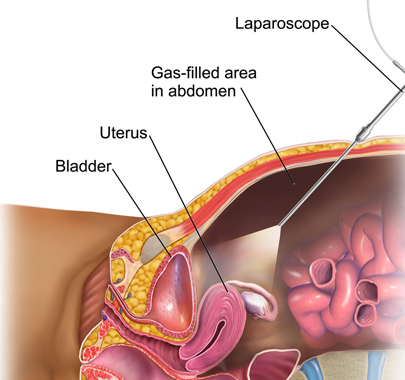WHAT IS LAPAROSCOPIC SURGERY
Laparoscopic surgery also referred to as key hole or minimally invasive surgery describes the performance of surgical procedures in the abdomen or chest cavity with the assistance of a video camera and several thin instruments. During the surgical procedure, few small incisions of up to half an inch are made and plastic tubes called ports are placed through these incisions. The abdomen cavity or chest is inflated with gas. The camera and the instruments are then introduced through the ports which allow access to the inside of the patient. The camera transmits an image of the organs inside the abdomen onto a television monitor. The surgeon is not able to see directly into the patient without the traditional large incision. The video camera becomes a surgeon’s eyes in laparoscopy surgery, since the surgeon uses the image from the video camera positioned inside the patient’s body to perform the procedure. Specific surgical instruments used in a laparoscopic surgery include: forceps, scissors, dissectors, hooks, retractors and more.

ADVANTAGES OF LAPAROSCOPY
WHAT PREPARATION DO I NEED TO DO?
As you will usually be under a general anaesthetic, your hospital should give you instructions about fasting before the operation. Depending on the reason for your operation, there may be more specific instructions. Your doctor will give you this information if necessary. You need to inform your doctor about medicines you have been on before surgery because some medicines like anticoagulants(blood thinners) may need to be stopped prior to surgery.
AFTER A LAPAROSCOPY?
You may feel a little sore around the cuts (incisions). You may have some pain in your shoulder tip. This is caused by the gas which had been pumped inside irritating the diaphragm which has the same nerve supply as the shoulder tip. This pain soon passes off. A short period of post anesthetic care, injectable pain killers for a short period, tubes in the abdomen for a day or two after surgery form part of the postoprerative care. Most of the procedures require a short hospital stay of 2- 3 days, even less than 24 hours, while few procedures like stomach or colorectal cancer surgery might require a stay of a week’s time.